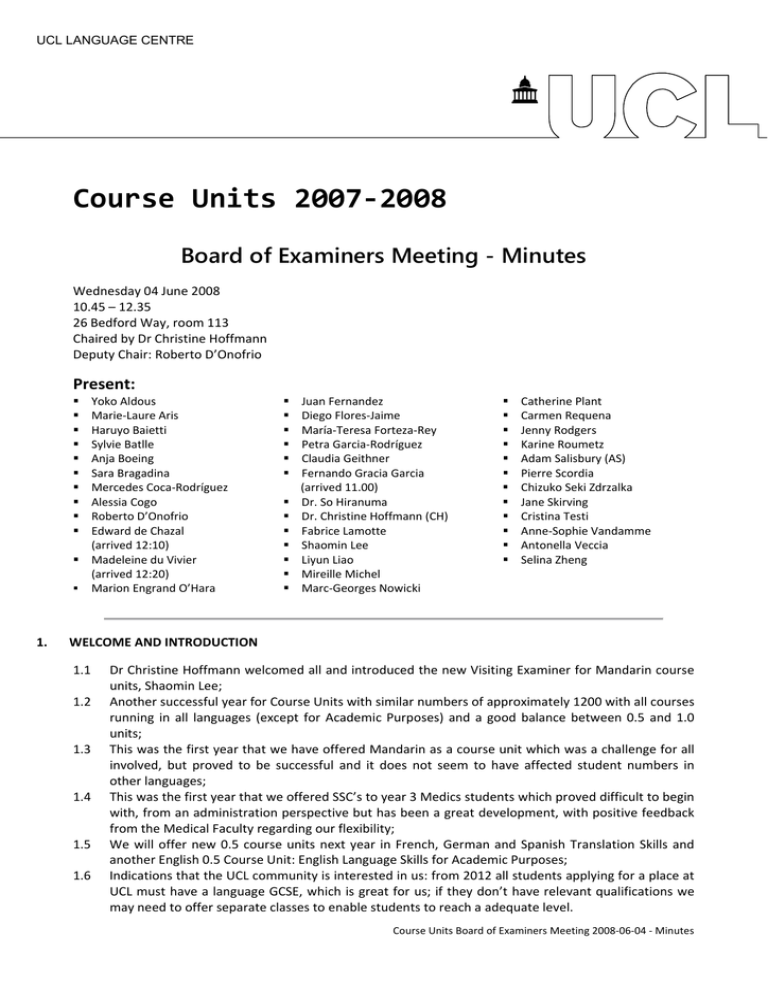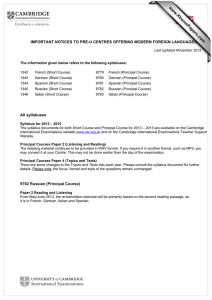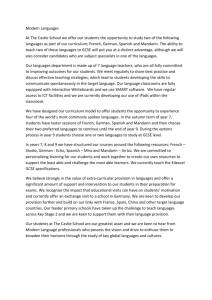Course Units 2007‐2008 Board of Examiners Meeting - Minutes
advertisement

UCL LANGUAGE CENTRE Course Units 2007‐2008 Board of Examiners Meeting - Minutes Wednesday 04 June 2008 10.45 – 12.35 26 Bedford Way, room 113 Chaired by Dr Christine Hoffmann Deputy Chair: Roberto D’Onofrio Present: Yoko Aldous Marie‐Laure Aris Haruyo Baietti Sylvie Batlle Anja Boeing Sara Bragadina Mercedes Coca‐Rodríguez Alessia Cogo Roberto D’Onofrio Edward de Chazal (arrived 12:10) Madeleine du Vivier (arrived 12:20) Marion Engrand O’Hara Juan Fernandez Diego Flores‐Jaime María‐Teresa Forteza‐Rey Petra Garcia‐Rodríguez Claudia Geithner Fernando Gracia Garcia (arrived 11.00) Dr. So Hiranuma Dr. Christine Hoffmann (CH) Fabrice Lamotte Shaomin Lee Liyun Liao Mireille Michel Marc‐Georges Nowicki Catherine Plant Carmen Requena Jenny Rodgers Karine Roumetz Adam Salisbury (AS) Pierre Scordia Chizuko Seki Zdrzalka Jane Skirving Cristina Testi Anne‐Sophie Vandamme Antonella Veccia Selina Zheng 1. WELCOME AND INTRODUCTION 1.1 1.2 1.3 1.4 1.5 1.6 Dr Christine Hoffmann welcomed all and introduced the new Visiting Examiner for Mandarin course units, Shaomin Lee; Another successful year for Course Units with similar numbers of approximately 1200 with all courses running in all languages (except for Academic Purposes) and a good balance between 0.5 and 1.0 units; This was the first year that we have offered Mandarin as a course unit which was a challenge for all involved, but proved to be successful and it does not seem to have affected student numbers in other languages; This was the first year that we offered SSC’s to year 3 Medics students which proved difficult to begin with, from an administration perspective but has been a great development, with positive feedback from the Medical Faculty regarding our flexibility; We will offer new 0.5 course units next year in French, German and Spanish Translation Skills and another English 0.5 Course Unit: English Language Skills for Academic Purposes; Indications that the UCL community is interested in us: from 2012 all students applying for a place at UCL must have a language GCSE, which is great for us; if they don’t have relevant qualifications we may need to offer separate classes to enable students to reach a adequate level. Course Units Board of Examiners Meeting 2008‐06‐04 ‐ Minutes APOLOGIES 2. 2.1 Dr Claudia Faust‐Bluhm (Visiting Examiner for German) and Ian McGrath (Visiting Examiner for Academic Writing in English for Non‐Native Speakers). 3. CONDUCT OF EXAMINATIONS 3.1 3.2 3.3 Everything ran smoothly except for one or two complaints from the examination hall regarding noise, which we have looked in to; It was useful that tutors collected exam scripts directly from the exam halls as this enabled marking to begin immediately which was crucial with the very tight schedule – huge thanks to all for their work; Portico proved again to be a rather difficult system to use, particularly when entering marks. 4. GENERAL COMMENTS Comments and observations from the External Examiners 4.1 Haruyo Baietti (Japanese): Great procedures are in place regarding assessment; however Japanese assessment is different to European – low levels should not be asked to use/look at authentic material as it is impossible for them to read: for the Project they could use some authentic material but also a piece about themselves using grammar & vocabulary that they are familiar with. For the final exam again, some authentic material in addition to sentences/questions set by tutors using grammar & vocabulary that they know; WE WOULD NEVER OFFER PURELY AUTHENTIC MATERIAL TO BEGINNER’S. There is some concern about the Grammar & Vocabulary assessment worth only 5% as grammar is crucial part of Language learning; also how can we assess students in December when they have hardly learnt anything by then; GRAMMAR IS COVERED IN ALL WORK THROUGHOUT THE COURSE; THE ASSESSMENT IN DECEMBER PROVIDES A GOOD REFLECTION OF STUDENTS’ ABILITY AT THE END OF THE FIRST TERM. 4.2 Alessia Cogo (Italian): Congratulations to the team for the high standard of content and assessment; Praise to the Language Centre for running the high level course even with low student numbers, it is great that you find ways to do this – some institutions do not. It provides continuity and experience. 4.3 Marion Engrand O’Hara (French): Thanks to all the team – teaching and administration; the French team have worked well and is a solid team thanks to the strong leadership of Mireille Michel; The development of new and innovative courses, of a high quality has been successful; The assessment structure has been very effective, with a good range of well‐balanced marks; the high quality level of the students is impressive; Praise also to the Academic Purposes courses which seem challenging and innovative – students have risen to the challenge. 4.4 Mercedes Coco‐Rodriguez (Spanish): Congratulations to the team and for the quality of the exam papers; Thanks for introducing digital recordings for the oral exams; it made them very easy to listen to and was a much better sound quality and was therefore a great success. THANKS GIVEN TO MERCEDES FOR RECOMMENDING LAST YEAR THAT WE USE THIS; WE WILL NOW USE THEM FOR ALL LANGUAGES AS CASSETTE RECORDINGS ARE OF POORER QUALITY – ALTHOUGH WE WILL NEED TO FIND A DIFFERENT WAY OF LABELLING THE P.C. FILES OF EACH RECORDING FOR NEXT YEAR AS THIS PROVED VERY TIME CONSUMING. Plagiarism: this is a difficult problem to tackle. One suggestion is to ask students to submit ideas for their project in writing throughout the year – some of their marks will them come from this, so they obtain marks from providing drafts and demonstrating their work; Course Units Board of Examiners Meeting 2008‐06‐04 ‐ Minutes MM: In the French team we train students in class to avoid “clumsy collage”, e.g. by working through previous projects with them. For the low levels, plagiarism is often a result of lack of guidance. 4.5 Shaomin Lee (Mandarin): This was the smallest team and the year was challenging as Mandarin was offered for the first time as a Course Unit, but we had very practical syllabi; Level A/B students seemed to be mainly European and to have struggled; Level B students need to have some exit point – there has been pressure on the tutors as students wanted higher levels; Level B results were excellent, some students from Hong Kong speak Cantonese and so their written work is almost native; LEVELS C, D AND BUSINESS WILL BE OFFERED NEXT YEAR. There were some extremely high (100%) marks given, mainly in the Grammar & Vocabulary assessment – there is room for improvement on this assessment, e.g. less multiple choice and only giving the full mark if the answer is fully correct, i.e. Chinese character is 100% correct; Overall excellent; always room for improvement – we do need to discriminate a little more with regards to marking. 4.6 Dr Claudia Faust Bluhm (German) – comments given by email directly to the German team; 4.7 Ian McGrath (Academic Writing in English for Non‐Native Speakers) – comments emailed and read by Chair: Assessment procedures have been carefully thought out and the team is to be commended on its conscientious application of these and on the results achieved; In a small number of cases, my marks for coursework varied from the moderated marks of the internal assessors, sometimes up to 5%, resulting in placing them in a different band. While this may have had little effect on the final grade, if viewed in relation to the macro descriptors it is potentially significant in terms of the message it sends about a students’ level to the department and the student; It is possible that the aggregated marks for separate elements of a piece of work do not necessarily reflect the overall quality of that piece of work. It is not clear if, before finalising a mark, especially with borderline cases, whether or not any judgement of the work and the students’ overall capability is made. 4.8 Gillian Lazaar (TEFL): There is a general impression of very strong students; The marking has been very fair and consistent, using a range of assessment criteria. Very satisfied. Comments and observations from Course Units Language Coordinators: 4.9 Dr So Hiranuma (Japanese): Another successful year – thanks to the team; One big change was to use short questions and answers for the Oral exam which went vey well; As always, quite a few failed the final exam, however some did very well – we could improve the vocabulary key at the bottom of the pages. 4.10 Roberto D’Onofrio (Italian): Thanks to the team for all their help and for respecting deadlines, while maintaining the quality; All levels ran this year, although students numbers were overall lower – also in other institutions; All high level students continued, so it is good that the demand is there and that we are able to give them to opportunity to do so. 4.11 Mireille Michel (French): Thanks to everyone involved and to the Coordinators for our exchanges and discussions; We are still discovering areas that we can improve on but the team should feel proud that all courses ran in French again this year and for demonstrating hard work, commitment and energy; 4.12 Fernando Gracia‐Garcia (Spanish): Thanks to Visiting Examiner for being so approachable, sharp and a pleasure to work with; Course Units Board of Examiners Meeting 2008‐06‐04 ‐ Minutes The team has worked hard and new members have integrated well. 4.13 Liyun Liao (Mandarin): This was the first year and therefore very challenging, so thanks to the team for the support and to other Coordinators; For next year we would like to introduce a small written test before Reading week 1 to assess and confirm the students’ level; The Visiting Examiner will look at the assessments before they are used; We should provide topics/sources to low level students to assist with their Project research. IT HAS BEEN INTERESTING FOR THE OTHER COORDINATORS OF EUROPEAN LANGUAGES TO HAVE JAPANESE AND NOW ALSO MANDARIN TO WORK WITH – IT SEEMS THE SAME PROBLEMS CAN ARISE WITH ALL LANGUAGES. 4.14 Anja Boeing (German): It has been another great year; there have been as many beginners as there are intermediate/advanced level students; Huge thanks to the team, especially for their efficient marking. 4.15 Edward de Chazal (Academic Writing in English for Non‐Native Speakers): It has been a good year and we have received great feedback from the Visiting Examiner. 4.16 Madeleine du Vivier (TEFL): A great year with a good team and good results; we increased the hours of teaching practice, so perhaps more teaching resulted in higher marks. 5. CONFIRMATION OF COURSE UNITS RESULTS 5.1 AS explained Referred Assessment to all, whereby continuing students on the new harmonised scheme, where they have gained a mark between 35% and 39% will be given an additional (supplementary) assessment over the summer in order to give the Board of Examiners the information it needs to make a pass/fail judgement on the student’s overall performance in that module. Should the student choose to take the referred assessment and pass, they will be awarded a mark of 40; or they can refuse the offer of referred assessment and re‐enter at the next normal opportunity, if all re‐sit attempts have not already been used, and gain the actual mark gained. We will offer any such assessments at the start of September 2008. 5.2 AS explained the procedures for categorising Extenuating Circumstances, however no cases of extenuating circumstances have been officially submitted this year for us to take into consideration. 5.3 SYLLABUS A: French, German, Italian, Japanese, Mandarin and Spanish 0.5 Course Units LCFR6001 Results approved; LCGE6001 Results approved; LCIT6001 Results approved; LCJA6001 Results approved; LCMA6001 Results approved; LCSP6001 Results approved. 5.4 SYLLABUS B French, German, Italian, Japanese, Mandarin and Spanish 0.5 and 1.0 Course Units LCFR6002 Results approved; LCGE6002 Results approved; LCIT6002 Results approved; LCJA6002 Results approved; LCMA6002 Results approved; LCSP6002 Results approved. LCFR6012 Results approved; LCGE6012 Results approved; LCIT6012 Results approved; LCJA6012 Results approved; LCMA6012 Results approved; LCSP6012 Results approved 5.5 SYLLABUS C French, German, Italian, Japanese and Spanish 0.5 and 1.0 Course Units Course Units Board of Examiners Meeting 2008‐06‐04 ‐ Minutes LCFR6003 Results approved; LCGE6003 Results approved; LCIT6003 Results approved; LCJA6003 Results approved; LCSP6003 Results approved; LCFR6023 Results approved; LCGE6023 Results approved; LCIT6023 Results approved; LCJA6023 Results approved; LCSP6023 Results approved. 5.6 Academic Purposes – Introduction French 0.5 Course Unit LCFR6803 Results approved 5.7 SYLLABUS D French, German, Italian, Japanese and Spanish 0.5 and 1.0 Course Units LCFR6004 Results approved; LCGE6004 Results approved; LCIT6004 Results approved; LCJA6004 Results approved; LCSP6004 Results approved; LCFR6034 Results approved; LCGE6034 Results approved; LCIT6034 Results approved; LCJA6034 Results approved; LCSP6034 Results approved. 5.8 BUSINESS AND CURRENT AFFAIRS French, German, Italian, Japanese and Spanish 0.5 and 1.0 Course Units LCFR6005 Results approved; LCGE6005 Results approved; LCIT6005 Results approved; LCJA6005 Results approved; LCSP6005 Results approved; LCFR6045 Results approved; LCGE6045Results approved; LCIT6045 Results approved; LCJA6045 Results approved; LCSP6045 Results approved. 5.9 CURRENT AFFAIRS AND CULTURE French, German, Italian and Spanish 0.5 Course Units French, German, Italian, Japanese and Spanish 1.0 Course Units LCFR6006 Results approved; LCGE6006 Results approved; LCIT6006 Results approved; LCSP6006 Results approved; LCFR6056 Results approved; LCGE6056 Results approved; LCIT6056 Results approved; LCJA6056 Results approved; LCSP6056 Results approved. 5.10 PROFESSIONAL PURPOSES II French, German, Italian and Spanish 0.5 Course Units French, German, Italian, Japanese and Spanish 1.0 Course Units LCFR6007 Results approved; LCGE6007 Results approved; LCIT6007 Results approved; LCSP6007 Results approved; LCFR6067 Results approved; LCGE6067 Results approved; LCIT6067 Results approved; LCJA6067 Results approved; LCSP6067 Results approved. 5.11 ACADEMIC PURPOSES II French, German, Japanese and Spanish 0.5 Course Units French and German 1.0 Course Units LCFR6807 Results approved; LCGE6807 Results approved; LCJA6807 Results approved; LCSP6807 Results approved; LCFR6867 Results approved; LCGE6867 Results approved; LCSP6867 Results approved. 5.12 FRENCH FOR ART HISTORIANS 0.5 COURSE UNIT LCFA6801 Results approved 5.13 ACADEMIC WRITING IN ENGLISH FOR NON‐NATIVE SPEAKER’S 0.5 COURSE UNIT LCEN6801 Results approved 5.14 TEACHING ENGLISH AS A FOREIGN LANGUGE 1.0 COURSE UNIT LCTE7900 Results approved Course Units Board of Examiners Meeting 2008‐06‐04 ‐ Minutes 6. CONFIRMATION OF SSC RESULTS 6.1 SYLLABUS A Arabic, French, Italian, Japanese, Mandarin and Spanish SSC’s All results approved 6.2 SYLLABUS B Arabic, French, Japanese, Mandarin and Spanish SSC’s All results approved 6.3 SYLLABUS C French and Spanish SSC’s All results approved 6.4 SYLLABUS D French and Spanish SSC’s All results approved 6.5 BUSINESS AND CURRENT AFFAIRS French, German and Spanish SSC’s All results approved 6.6 BUSINESS AND CURRENT AFFAIRS (HIGHER) Spanish SSC’s Result approved 6.7 PROFESSIONAL PURPOSES II French SSC’s All results approved 7. DATES FOR 2008‐2009 7.1 Provisional date for the next Board of Examiners meeting – Wednesday 10 June 2009 8. ANY OTHER BUSINESS 8.1 There were some issues with the quality of our final exam papers, with the photocopying, particularly for Mandarin; we have reported the problem to UCL Registry. 8.2 We will apply for a fifth year to have Marion Engrand‐O’Hara as our External Examiner for French, especially with the introduction of our French Translation Skills course next year; it would be good to have her on board again. Meeting closed at 12:35. Course Unit Administrative Assistant +44 (0)20 7679 5481 25 June 2008 Course Units Board of Examiners Meeting 2008‐06‐04 ‐ Minutes



